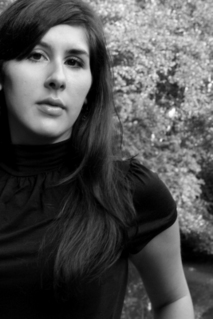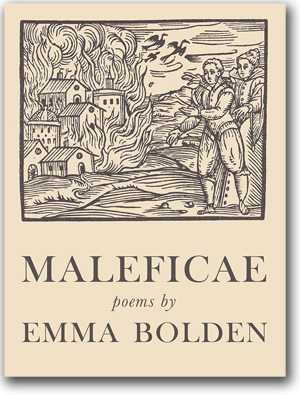Maleficae
Emma Bolden
GenPop Books
Poetry, 6″ x 8″, 80 pp, trade paperback
May 2013
OUT OF PRINT
During the European witch trials, over one hundred thousand people were prosecuted for maleficia. The vast majority were women. Many were unmarried. Many owned property. Some were midwives who counseled village women about their health, their pregnancies, and their marriages. Others were simply non-conformists. Maleficae tells the story of one so-called witch: a woman who, like many others, was once seen as her village’s savior, but became the focus of the villagers’ fear and rage when disaster struck.
This book-length series of poems seeks to re-create the terror and inhumanity of the trials. Incorporating language from trial records to papal bulls to incendiary theological documents, these poems explore the intersection of forces that led to the persecution of people who were deemed different and therefore dangerous—forces alarmingly similar to those still operating today. At the center of all of this is the woman who was called a witch: her story, her wail from the center of the flames. In allowing her new testimony, in allowing the dead to speak, Maleficae gives voice to the voiceless victims of the trials.
In this incantatory series of lyric poems Emma Bolden finds a new way to write about an old (though still current) subject. This book speaks in many tongues, many vivid, and living tongues.
—Thomas Lux
Emma Bolden’s Maleficae is an ambitious and powerful accomplishment. Informed by historical records of European witchcraft trials, it is wholly contemporary in its layered complexity and poetic craft. Incantatory rhythms, shifting perspectives and voices, and vividly rendered dream/nightmare imagery make these poems hypnotic and haunting. The contrast between historical content and contemporary form—between fact and imagination—intensifies the dramatic impact and reminds us that the past is, in one form or another, always present.
—Eric Nelson
Lust, freedom, repression, sin, shame. The fearful, oppressive denial of female empowerment and agency. Maleficae has all the conceptual intelligence of a Feminist study, but it makes its argument via artful imagined experience. This is a poetry “possessed” of a musical and rhetorical mastery that cast their own incantatory spell, compelling us to feel the thin membrane between modernity and our past, between pragmatism and inner mystery. It made me think of those Anne Sexton poems that utilize and transcend her confessionalism, speaking not just for herself, but for all women.
—Mark Cox
Some centuries back Emma Bolden would have been burned at the stake as a witch. For similar reasons, her poetry insists on such intimacies that we are not going to be who we were by the time she is done with us. Audacious to attempt poems that would show us ourselves as we are, filled with the lust of the hunt… the terror of the taking, if indeed we would ever confess. Only the few who show up every now and then with the genius that demands they sacrifice their lives to the craft of making a poem even come close to making us see ourselves. Bolden’s Maleficae freely achieves nothing less than impossibly holding our very souls before us, again and again and again and again.
—Louie Skipper
Excerpts
Poems from Maleficae may be found in the following journals:
American Poetry Journal, Campbell Corner Poetry Prize, Cincinnati Review, Copper Nickel, The Cortland Review, Country Dog Review, Feminist Studies, The Greensboro Review, Guernica, Indiana Review, James Dickey Review, The Journal, Linebreak, Memorious, Prairie Schooner, PIF Magazine, Red Mountain Review, Redivider, Sawbuck, Southern Humanities Review, Tapestry, and Whiskey Island.
About the Author
 Emma Bolden was born and raised in Alabama. She received a BLA from Sarah Lawrence College and an MFA from the University of North Carolina Wilmington. She is the author of three chapbooks of poetry: How to Recognize a Lady, (part of Edge by Edge, the third in Toadlily Press’ Quartet Series); The Mariner’s Wife (Finishing Line Press); and The Sad Epistles (Dancing Girl Press). Her manuscripts have been semi-finalists for the Crab Orchard Review Poetry Series’ First Book Prize, the Perugia Press Book Prize, the Brittingham and Felix Pollak Prizes in Poetry, and the Blue Lynx Prize for Poetry, as well as a finalist for the Cleveland State University Poetry Center’s First Book Prize. She is an assistant professor of Creative Writing at Georgia Southern University and blogs at A Century of Nerve (emmabolden.com).
Emma Bolden was born and raised in Alabama. She received a BLA from Sarah Lawrence College and an MFA from the University of North Carolina Wilmington. She is the author of three chapbooks of poetry: How to Recognize a Lady, (part of Edge by Edge, the third in Toadlily Press’ Quartet Series); The Mariner’s Wife (Finishing Line Press); and The Sad Epistles (Dancing Girl Press). Her manuscripts have been semi-finalists for the Crab Orchard Review Poetry Series’ First Book Prize, the Perugia Press Book Prize, the Brittingham and Felix Pollak Prizes in Poetry, and the Blue Lynx Prize for Poetry, as well as a finalist for the Cleveland State University Poetry Center’s First Book Prize. She is an assistant professor of Creative Writing at Georgia Southern University and blogs at A Century of Nerve (emmabolden.com).

